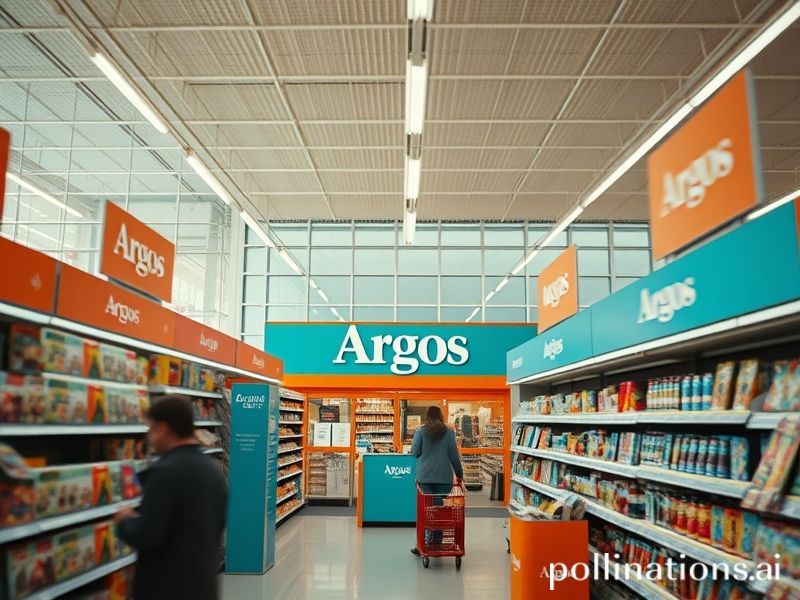Sainsbury’s Argos: How Britain Conquered the World One 3 A.M. Waffle Maker at a Time
Sainsbury’s Argos: The Quiet British Invasion of Global Living Rooms
By the time you finish reading this sentence, another Argos “Fast Track” van will have screeched away from a Sainsbury’s car park somewhere in the Home Counties, bound for a semi-detached house whose occupant just ordered a £39.99 air fryer at 2:17 a.m. in a fit of carb-induced insomnia. Multiply that by 883,000 orders a week, factor in the 1,400 pickup points from Inverness to Gibraltar (yes, really), and you have the stealthiest British export since James Bond’s smirk: a hybrid supermarket-catalogue-colonial outpost that has quietly become the Ikea of impulse control.
To the uninitiated, Sainsbury’s Argos looks like a marriage of convenience between a 154-year-old grocer and a catalogue retailer your nan once used to buy a foot spa. Internationally, though, the partnership is less romantic comedy and more geopolitical sleeper cell. While Washington bickers about TikTok’s data pipelines and Brussels frets over Chinese cranes, Britain has slipped an entire retail Trojan horse into 38 countries via franchises, concessions, and the dark magic of “click-and-collect.” In Mumbai, your yoga instructor collects a cordless Dyson from inside a local department store that smells of cardamom and existential dread. In Riyadh, a sheikh’s PA picks up a Star Wars waffle maker—proof that the Force, like late-stage capitalism, penetrates all cultures equally.
The genius lies in the banality. Argos doesn’t sell you dreams; it sells the dream of marginally better inconvenience management. Need a replacement kettle by tea time? There’s an Argos drawer inside Sainsbury’s humming like a server farm, staffed by teenagers who have seen too much and pensioners who haven’t seen enough. The operation is so frictionless it makes Amazon’s drones look like overachieving mosquitoes. And because the brand peddles necessity rather than luxury, it sidesteps the usual anti-globalisation backlash. Nobody burns down a Sainsbury’s Argos for cultural imperialism; they just want their electric toothbrush heads before gingivitis sets in.
Economically, the model is a masterclass in hedged despair. When sterling wobbles, Sainsbury’s leans on Argos’s higher-margin electronics; when consumers tighten belts, groceries pick up the slack. The balance sheet becomes a perpetual see-saw powered by human anxiety—Brexit, pandemic, cost-of-living crisis, whatever fresh apocalypse tomorrow brings. Meanwhile, suppliers from Shenzhen to São Paulo calibrate their factories to the rhythms of British ennui. A single SKU delay in a kids’ slime kit can ripple across three continents, reminding us that global supply chains are really just very long, very fragile attempts to distract us from the void.
Culturally, the franchise is even more subversive. Argos catalogues—once printed on dead trees, now pixelated on apps—function as a sort of low-brow United Nations. Page 47 of the spring/summer edition unites a Filipino nanny in Kuwait, a Norwegian gamer, and a Texan divorcee around the same £79 gaming chair upholstered in fake leather and real disappointment. The chair will collapse within 18 months, but the shared experience endures, like herpes or ABBA. Critics sneer at the homogenisation of taste, yet Argos proves that taste was never the point; the point is arriving at the same mediocre compromise faster than ever before.
Environmentalists, bless their hemp socks, warn that same-day delivery of throwaway kettles is cooking the planet faster than the kettle itself. Sainsbury’s counters with pledges to be Net Zero by 2040—roughly two decades after the last polar bear signs up for Prime. In the meantime, the vans keep humming, ferrying miniature dehumidifiers and karaoke machines across borders, each parcel a tiny act of planetary vandalism wrapped in recyclable cardboard.
So what does Sainsbury’s Argos tell us about the state of the world? Simply that the final frontier of empire is no longer territory but logistics. While nations argue over tariffs and TikTok, Britain has colonised the 3 a.m. self-loathing purchase. The sun never sets on a civilisation that can deliver a waffle maker to a war zone before the ceasefire expires. And somewhere in a fluorescent-lit aisle between the baked beans and the Bluetooth speakers, a teenager scans a barcode and wonders, briefly, if this is all there is. Then the printer spits out another receipt, and the moment passes—commodified, bagged, and ready for collection.







